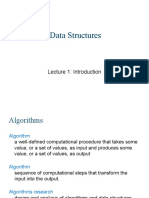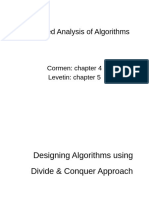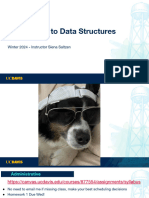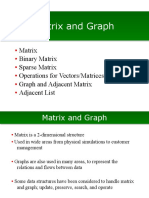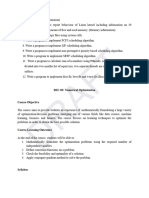Algorithms - Inversion Count Using Haskell
Uploaded by
pi194043Algorithms - Inversion Count Using Haskell
Uploaded by
pi194043Algorithms Counting Inversions using Haskell
Pi19404
July 30, 2013
Contents
Contents
Algorithms - Counting Inversions using Haskell 3
0.1 Introduction . . . . . . 0.2 Inversion . . . . . . . . . 0.2.1 Implementation 0.2.2 Code . . . . . . . References . . . . . . . . . .
. . . . .
. . . . .
. . . . .
. . . . .
. . . . .
. . . . .
. . . . .
. . . . .
. . . . .
. . . . .
. . . . .
. . . . .
. . . . .
. . . . .
. . . . .
. . . . .
. . . . .
. . . . .
. . . . .
. . . . .
. . . . .
. . . . .
. . . . .
. . . . .
3 3 3 6 6
2|6
Algorithms - Counting Inversions using Haskell
Algorithms - Counting Inversions using Haskell
0.1 Introduction
In this article we will look at Divide and conquer approach using merge sort algorithm to count the number of inversion in an array
0.2 Inversion
The count of inversion in an array is the count of a[i] > a[j ] for i > j .This is basicially the number of comparisions required to arrage the elements in sorted order. The number of inversion for sorted array is 0 while for a re1 ,maximum number of inversions that can be verse array is nn 2 encountered for unsorted array. The naive way of counting iversion would be to count all instance of a[i] > a[j ] for i > j ,which is O(N 2 ). The merge sort can be used to count inversion.
0.2.1 Implementation
In the merge sort algorithm ,in the merge step we check instance x > y of the first element of array A with the first element of array B.And if x > y ,condition would require inversion. Thus in the merge step we count all the instances of x > y condition is statisfied. This applies to case when A and B are unsorted arrays. In the present implementation we have used a boolean flag to inform the merge step if the input arrays are sorted or unsorted.
3|6
Algorithms - Counting Inversions using Haskell Now if both A and B are sorted and inversion in encountered A(1) > B (1),then total number of inversion encountered in the union of A,B can be expressed as length(A). For examples A = [3; 5] and B = [1; 2] , the number of inversion required wrt element (3; 1) is 1,thus any element greater than 3 in sorted array A will also require the same number of inversions.Thus total number of inversions is counted as 2 for pairs (3; 1); (5; 1).Similarily in the next step for the array A = [3; 5] and B = [2] the total number of inversions are 2 for pairs (3; 2); (5; 2).Thus in general the number of inversion encoutered at each step are length(A). The implementation of algorithm in Haskel is provided.
--split -- split an array of size N into two arrays of size N/2 -- the computation of total length of the list is required split :: Ord a =>[a]->Int->([a],[a],Int) split s i= (l1,l2,(i+1)) where (l1,l2)=splitAt ( div (length(s)) 2 ) s --merge sort -- the function to merge the 2 sorted lists -- iput is the lists to be sorted and current number of inversions -- output is merger list + total number of computation required for merge -- flag is used to indicate if array is sorted or unsorted -- used for inversion count merge1 :: Ord a =>[a]->[a]->Int->Bool->([a],Int) merge1 [] xs i _ = (xs,i) merge1 xs [] i _ = (xs,i) merge1 (x:xs) (y:ys) i flag |x<y = (x:a1,a2) |otherwise = case flag of t|t==False->(y:b1,b2) |otherwise->(y:b1,b1) where (a1,a2)=merge1 xs (y:ys) (i) flag (b1,b2)=merge1 (x:xs) ys (i1) flag i1=case flag of -- inversion of single element considered for unsorted array t|t==False->(i+1) -- inversion of all elements >x considered is A,B sorted array |otherwise -> i+length(x:xs)
4|6
Algorithms - Counting Inversions using Haskell
-- the recrsive for merge sort algorithm -- input is list ,output is merge sorted list and number of inversions merge_sort' :: Ord a=>[a]->Int->([a],Int) merge_sort' list i | length(list)==1=(list,i) | otherwise =(o1,o2) where (list1,list2,m5)=(split list 0) (list3,m3)=merge_sort' list1 (0) (list4,m4)=merge_sort' list2 (0) -- call merge with true flag for inversion count (o1,o2)=merge1 list3 list4 (m3+m4) True -- main function to be called for merge sort algoritm merge_sort :: Ord a =>[a]->([a],Int) merge_sort s = merge_sort' s 0 -- function to split array,if i is positive position from -- start of list,if i is negative position from end of list select :: Ord a=>[a]->Int-> ([a],[a]) select (n) i= case i of t| t<=0 -> splitAt (length(n)+t) n |otherwise -> splitAt t n
-- function to read input from a file,each element of line -- placed in a seperate line,if i=-1 the last line of file -- contains result of inversion and is displayed in the result readFile :: FilePath ->Int-> IO (Int,[Int]) readFile path int1 = do contents <- readFile path return(execute (select (map readInt1 (lines contents)) (int where execute (s,s1) =(snd(merge_sort s),s1) -- function to convert string to int readInt1 :: String -> Int readInt1 = read
5|6
Algorithms - Counting Inversions using Haskell
0.2.2 Code
The Haskell code can be found at https://github.com/pi19404/m19404/ blob/master/Algorithm/sort/sort.hs
6|6
You might also like
- Download Introduction to algorithms solutions 3rd Edition Thomas H. Cormen ebook All Chapters PDF100% (15)Download Introduction to algorithms solutions 3rd Edition Thomas H. Cormen ebook All Chapters PDF60 pages
- Data Structures and Algorithms: (CS210/ESO207/ESO211)No ratings yetData Structures and Algorithms: (CS210/ESO207/ESO211)21 pages
- (Ebook) Introduction to algorithms [solutions] by Thomas H. Cormen, Charles E. Leiserson, Ronald L. Rivest, Clifford Stein ISBN 9780262033848, 9780262533058, 9780262259460, 0262033844, 0262533057, 026225946X pdf downloadNo ratings yet(Ebook) Introduction to algorithms [solutions] by Thomas H. Cormen, Charles E. Leiserson, Ronald L. Rivest, Clifford Stein ISBN 9780262033848, 9780262533058, 9780262259460, 0262033844, 0262533057, 026225946X pdf download34 pages
- Unit 4-Decrease and Conquer & Divide and ConquerNo ratings yetUnit 4-Decrease and Conquer & Divide and Conquer13 pages
- Data Structures: Lecture 1: IntroductionNo ratings yetData Structures: Lecture 1: Introduction27 pages
- Instant ebooks textbook Introduction to algorithms solutions 3rd Edition Thomas H. Cormen download all chapters100% (6)Instant ebooks textbook Introduction to algorithms solutions 3rd Edition Thomas H. Cormen download all chapters61 pages
- Lecture 4.2 Counting Sort Algorithms(1)No ratings yetLecture 4.2 Counting Sort Algorithms(1)23 pages
- Programming Assignment 4: Divide-and-ConquerNo ratings yetProgramming Assignment 4: Divide-and-Conquer15 pages
- Week 02 (Complexity of Sorting Algorithms)No ratings yetWeek 02 (Complexity of Sorting Algorithms)62 pages
- Lecture 20- Counting Inversions & Closest Pair of PointsNo ratings yetLecture 20- Counting Inversions & Closest Pair of Points47 pages
- FALLSEM2024-25 BCSE202L TH VL2024250101821 2024-09-19 Reference-Material-INo ratings yetFALLSEM2024-25 BCSE202L TH VL2024250101821 2024-09-19 Reference-Material-I5 pages
- Basic Sorting Algorithms Using Haskell - 1No ratings yetBasic Sorting Algorithms Using Haskell - 17 pages
- Sequential and Parallel Sorting AlgorithmsNo ratings yetSequential and Parallel Sorting Algorithms63 pages
- CORE - 14: Algorithm Design Techniques (Unit - 2)No ratings yetCORE - 14: Algorithm Design Techniques (Unit - 2)14 pages
- Matrices with MATLAB (Taken from "MATLAB for Beginners: A Gentle Approach")From EverandMatrices with MATLAB (Taken from "MATLAB for Beginners: A Gentle Approach")3/5 (4)
- Multi Class Logistic Regression Training and TestingNo ratings yetMulti Class Logistic Regression Training and Testing9 pages
- Dense Optical Flow Expansion Based On Polynomial Basis ApproximationNo ratings yetDense Optical Flow Expansion Based On Polynomial Basis Approximation12 pages
- Implementation of Discrete Hidden Markov Model For Sequence Classification in C++ Using EigenNo ratings yetImplementation of Discrete Hidden Markov Model For Sequence Classification in C++ Using Eigen8 pages
- Polynomial Approximation of 2D Image Patch - Part 2No ratings yetPolynomial Approximation of 2D Image Patch - Part 214 pages
- OpenVision Library Gaussian Mixture Model ImplementationNo ratings yetOpenVision Library Gaussian Mixture Model Implementation5 pages
- Markov Chain Implementation in C++ Using EigenNo ratings yetMarkov Chain Implementation in C++ Using Eigen9 pages
- Fast 2D Separable Symmetric/Anti-Symmmetric ConvolutionNo ratings yetFast 2D Separable Symmetric/Anti-Symmmetric Convolution7 pages
- Integral Image For Computation of Mean and VarianceNo ratings yetIntegral Image For Computation of Mean and Variance5 pages
- Ecs 32C Introduction To Data Structures: Winter 2024 - Instructor Siena SaltzenNo ratings yetEcs 32C Introduction To Data Structures: Winter 2024 - Instructor Siena Saltzen49 pages
- Gilbert-Johnson-Keerthi Distance Algorithm: Convex Sets Support Function Simplices Minkowski DifferenceNo ratings yetGilbert-Johnson-Keerthi Distance Algorithm: Convex Sets Support Function Simplices Minkowski Difference2 pages
- Introduction of Analysis Design & AlgorithmNo ratings yetIntroduction of Analysis Design & Algorithm42 pages
- Markov Decision Processes and Exact Solution MethodsNo ratings yetMarkov Decision Processes and Exact Solution Methods34 pages
- Lecture2 - System of Equations - Direct MethodsNo ratings yetLecture2 - System of Equations - Direct Methods43 pages
- Classification: Basic Concepts and Decision TreesNo ratings yetClassification: Basic Concepts and Decision Trees56 pages
- 2010 Canadian Computing Competition: Senior Division: SponsorNo ratings yet2010 Canadian Computing Competition: Senior Division: Sponsor12 pages
- Course DataCamp Classification With XGBoost100% (1)Course DataCamp Classification With XGBoost39 pages
- DSA-II Practical Lab book Solutions.docxNo ratings yetDSA-II Practical Lab book Solutions.docx60 pages















